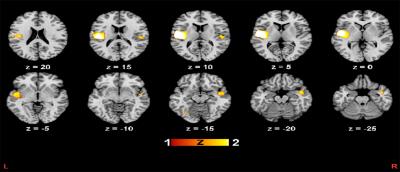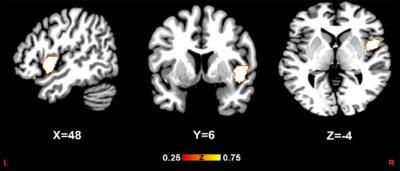lin lin1 and Guangyao wu1
1radiology, Affiliated Zhongshan Hospital of Dalian University, Dalian, People's Republic of China
Synopsis
To our knowledge, this is
the first whole-brain VBM meta-analysis showing a reduced volume of whole and
regional gray matter (GM) in the brains of type 2 diabetes mellitus (T2DM)
patients. we used a new meta-analytic tool, signed differential mapping to
identify consistent results about global and regional abnormalities in T2DM,
and explore the relationship between cognitive and GM alternations. We showed educed
volume of whole and regional GM in T2DM patients, particularly in the temporal
lobe, the GM volumes of the right insula were positively correlated with MMSE
scores, and those changes may indicate a risk of dementia.
Purpose
Increasing
neuroimaging studies of voxel-based morphometry (VBM) have revealed gray matter (GM) anomalies in patients with type 2 diabetes mellitus (T2DM)1. However, not all
the studies reported
entirely consistent findings, which may be due to small
and heterogeneous samples of participants2-4, there
has been increasing interest in using the meta-analysis approach to identify
consistent results. So the aim of our study was to identify the alternations of global gray matter volumes (GMV) and consistent regional abnormalities in T2DM patients.Method
A systematic search of
relevant studies published in PubMed and Embase databases
from January 2000 to March 2016 was conducted
using a combination of
keywords: (“voxel-based” OR “voxel-wise” OR “volumetric” OR “voxel based morphometry” OR “VBM” OR “morphometry” OR
“gray matter”) AND (“diabetes” OR “diabetic” OR “diabetes mellitus” OR “type 2 diabetes
mellitus” OR “T2DM”). Neuroimaging studies of both volumetric data and whole-brain VBM data were included. A quantitative
meta-analysis of volumetric and whole-brain VBM studies in patients with T2DM
compared with healthy controls (HCs) were performed
by means of STATA package v.12.0 and anisotropic effect size version of signed differential mapping (AES-SDM) software
package respectively. Result
A total of 15 volumetric studies(1561 T2DM patients and 869 HCs) and 5 VBM studies (110 T2DM patients and 103 HCs) on GM investigations in T2DM patients vs. HCs were identified. The volumetric meta-analysis showed that there were significant
differences (SMD=−0.56,95%CI=−0.81 to −0.31, P<0.01) of GMV between the two groups, suggesting that GMV of patients with T2DM was lower than HCs. The whole-brain VBM
meta-analysis revealed that gray matter reductions in the left superior temporal gyrus, the right
middle temporal gyrus, the right rolandic operculum, and the left fusiform gyrus in the T2DM patients compared with the
HCs. No GMV increases were found. The results remained largely unchanged in the following jackknife sensitivity analyses. Meta-regression
analysis showed that Mini-Mental State Examination
(MMSE) scores have a positive relationship with the GMV in the right insula.Discussion
We have revealed
widespread GM atrophy, as well as regional
atrophy, particularly in the right MTG. The MTG is implicated in
neurodegeneration in T2DM such as regional neuronal loss, vascular
abnormalities, micro-infarcts, hypometabolism, lower cerebral blood flow, and
the like1,4. The MTG is part of the default mode network (DMN),
which has been closely linked to
cognition functions5. Based on these
findings, we suggest that MTG atrophy may relate to cognitive dysfunction, and
accelerate the transition from normal cognition to MCI in T2DM patients. The fusiform gyri are frequently identified a "visual-form area"6,
our results show that The fusiform gyri is atropht inT2DM patients, which
suggests that T2DM may have attention, memory and visual dysfunction. Another
finding in our meta-analysis was that MMSE scores had a positive relationship
with GMV in the right insula.
The insula plays important integrative roles, it is also a core node of the
salience network which is damaged in AD and MCI7-8Conclusion
To our knowledge, this is the first whole-brain VBM meta-analysis showing the reduced volume of whole and regional gray matter in brain of T2DM
patients, especially in the temporal lobe; the GM volumes of right insula had a positive relationship with MMSE scores, and
those changes may be risk for the dementia. Further longitudinal search is need
to confirm the gray matters changes and cognition dysfunction and their relationship to understand the pathophysiological
mechanism underlying T2DM-induced cognitive impairment.Acknowledgements
No acknowledgement found.References
1. Chen Z, Li L, Sun J, Ma L,
et al. Mapping the brain in type II diabetes: Voxel-based morphometry using
DARTEL. European Journal of Radiology.2012;81:1870–1876.
2. Yau PL, Javier DC, Ryan
CM, Tsui WH, Ardekani BA, Ten S, Convit A,et al. Preliminary evidence for brain
complications in obese adolescents with type 2 diabetes mellitus.Diabetologia.2010;53:2298–2306.
3. Zhang Y, Zhang X, Zhang J,
Liu C, Yuan Q, Yin X, Wei L, Cui J, Tao R, Wei P, Wang J, et al. Gray matter
volume abnormalities in type 2 diabetes mellitus with and without mild
cognitive impairment. Neuroscience Letters.2014;562:1–6.
4. Natalia
Garc´ia-Casares, Marcelo L. Berthier, et
al. Structural and Functional Brain Changes in Middle-Aged Type 2 Diabetic
Patients: A Cross-Sectional Study. Journal of Alzheimer's Disease.2014;40:375–386.
5. Fox MD, Corbetta M,
Snyder AZ, Vincent JL, Raichle ME, et al.Spontaneous neuronal activity
distinguishes human dorsal and ventral attention systems. Proc.Natl. Acad. Sci.
U. S. A.2006;103: 10046–10051.
6. Dehaene, S., Cohen, L,
et al. The unique role of the visual word form area in reading. Trends CognSci.2011;15:254–262.
7. Kurth Florian, Zilles
Karl, Peter T. Fox, Angela R. Laird, Simon B. Eickhoff. A link between the
systems: functional differentiation and integration within the human insula
revealed by meta-analysis. Brain StructFunct .2010;214:519–534.
8. Menon V,Uddin LQ. Saliency,
switching, attention and control: a network model of insula function. Brain
StructFunct. 2010;214: 655-667.


